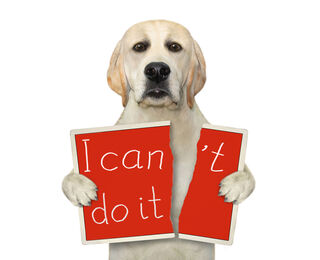Optimism
Hope, Dogs, and Weight Loss
Hope is a way to escape weight loss failures.
Posted October 5, 2022 Reviewed by Davia Sills
Key points
- We can use research on learned helplessness to illuminate the process where people get stuck in a rut when trying to lose weight.
- Hope can lead to a learned optimism that can create solutions and perseverance.
- There are many salient features of hope that can turn helplessness into success.

Whether it is for health or other reasons, at any given time, many adults in this country are on a diet. Some of them for the third, fourth, or fifth time in the past year. Clearly, there is a lot of frustration out there. Whatever they are doing is not working. Many people see themselves as failures because of it, and many eventually give up.
What can be done to turn this around?
To at least partially answer this question, we can go back to 1967 and M.E.P. Seligman and colleagues’ classic research on learned helplessness. Then, we can take a look at his research in the ensuing years.
Back in 1967, some experiments were set up that gave dogs a shock in a situation where they had no way to escape. Eventually, they became listless and passive. Then, when put in a situation where they could escape a shock, they failed to do so. They had already “learned” that it was hopeless.
Perhaps because of his findings back then, Seligman turned to studying humans and depression. He wanted to find a way to help. Many decades after his dog studies, he was instrumental in setting up the field of positive psychology.
Now we circle back to people trying to lose weight. Research tells us that dietary helplessness has been found to be significant in obese individuals and in those who have experienced weight cycling or fluctuations. These groups are also prone to suffering from depression.
Seligman began to focus on hope as a way to create an escape from depression and the helplessness or hopelessness that accompanies it. According to Seligman, one of the sweeping characteristics of depression and helplessness is that the individual does not sense that there are many options available to change the situation.
In his book Learned Optimism, Seligman suggested that it is possible to realize that adverse situations are not permanent. This opens up the possibility that the situation can be seen as a challenge, not a personal failure. (This concept has been spelled out brilliantly by Carol Dweck in her book, Mindset.) A person does not need to stay stuck in thoughts that they have failed, are a failure, have no agency, or have limited options.
In fact, Seligman notes that hope is probably the best natural defense against helplessness.
How hope can change us:
How does hope conquer a person’s sense of helplessness when faced with the daunting task of trying to lose weight?
Hope creates autonomy. Research tells us that a sense of autonomy over any behavior that we are trying to change is essential. You could also call it self-efficacy or self-determination and be in the same ballpark. Hope means that we can start to explore options, figure out what is meaningful to us, and take action.
Unfortunately, many people follow diets or prescribed programs. Once in a while, there may be a success. But often, doing so actually gives an individual “false hope.” By signing up for a program, the person is letting others call the shots. They may even feel that, after all, they are taking action by following a program. Action is good. But following a diet implies a “just tell me what to do” approach, a passivity that does not facilitate learning or taking control of the process.
Hope creates optimism. Seligman noted that giving people access to hope produces what he called “flexible optimism.” Meaning individuals are free to apply hope in the form of finding new ways to succeed. Once there is no fallback to feeling like a failure, a person can begin to look around for ways to solve the problem that they were not able to consider before. Their motivation takes on a much different palette than using the old paradigm of having to keep up the motivation to follow a restrictive diet.
Hope makes us able to persevere in the face of a challenge. Seligman noted that optimism is crucial to perseverance. You can see the problem as a challenge with many potential solutions. In terms of losing weight, hope means that you can be open to trying new strategies, making new plans, and learning new skills. Losing weight involves a very complex set of behavior changes. Hope helps a person become aware of the complexities but gives them the underpinnings to deal with them.
Hope can change the internal dialogue.
For example, the individual can begin to ask themselves questions like:
- Why do I want this?
- What is it that I value about myself?
- Am I ready to pull out my problem-solving skills to make this happen?
- What have I done in the past that hasn’t worked? Why?
- Am I willing to wonder why I have certain habits around food?
In addition, new strategies can be developed to anticipate things that life throws at us. For example:
- Resistance to change, which is inevitable
- Resistance or even sabotage from those around us
- Eating habits that are on auto-pilot (mindless eating)
- Emotional eating habits and cravings
- Falling back on old food shopping and cooking habits
These are by no means exhaustive lists! There are many challenges. But with hope and the right guidance, individuals can start to move toward their goals and desires.
References
Maier, S.F. & Seligman, M.E.P. (2016). Learned helplessness at fifty: insights from neuroscience. Psychological Review, 123(4), 349-367.
Seligman, M.E.P. (1990). Learned Optimism: How to Change Your Mind and Your Life. Vintage Books, a Division of Random House, NY.
Dweck, Carol S. (2006). Mindset: The New Psychology of Success. Ballentine Books, NY.
Carmody, T.P., Brunner, R.L., Sachiko, T.S. (1995) Dietary helplessness and disinhibition in weight cyclers and maintainers. International Journal of Eating Disorders, 18(3), 247-256.




